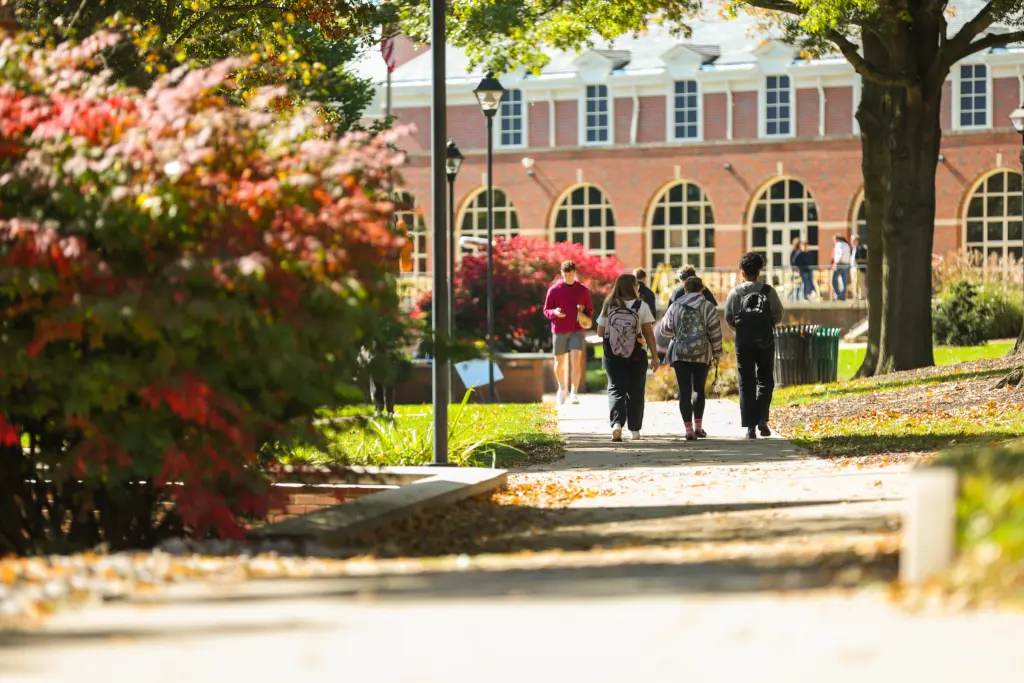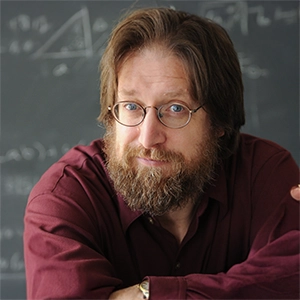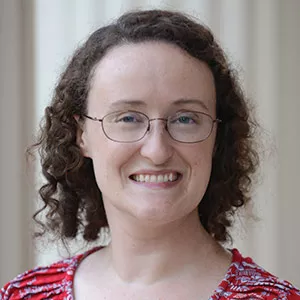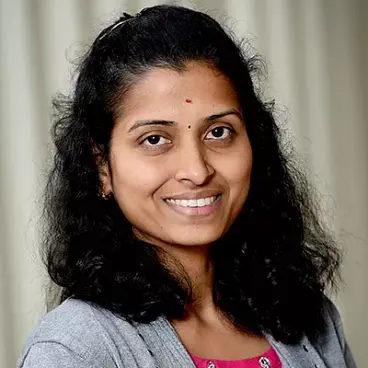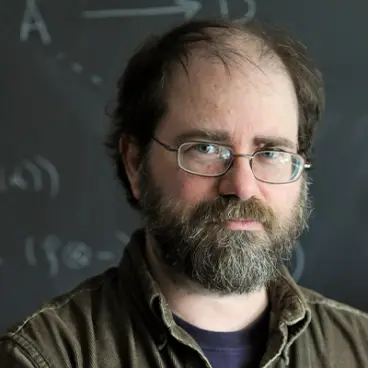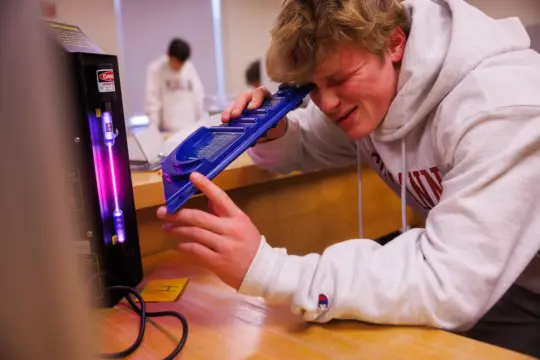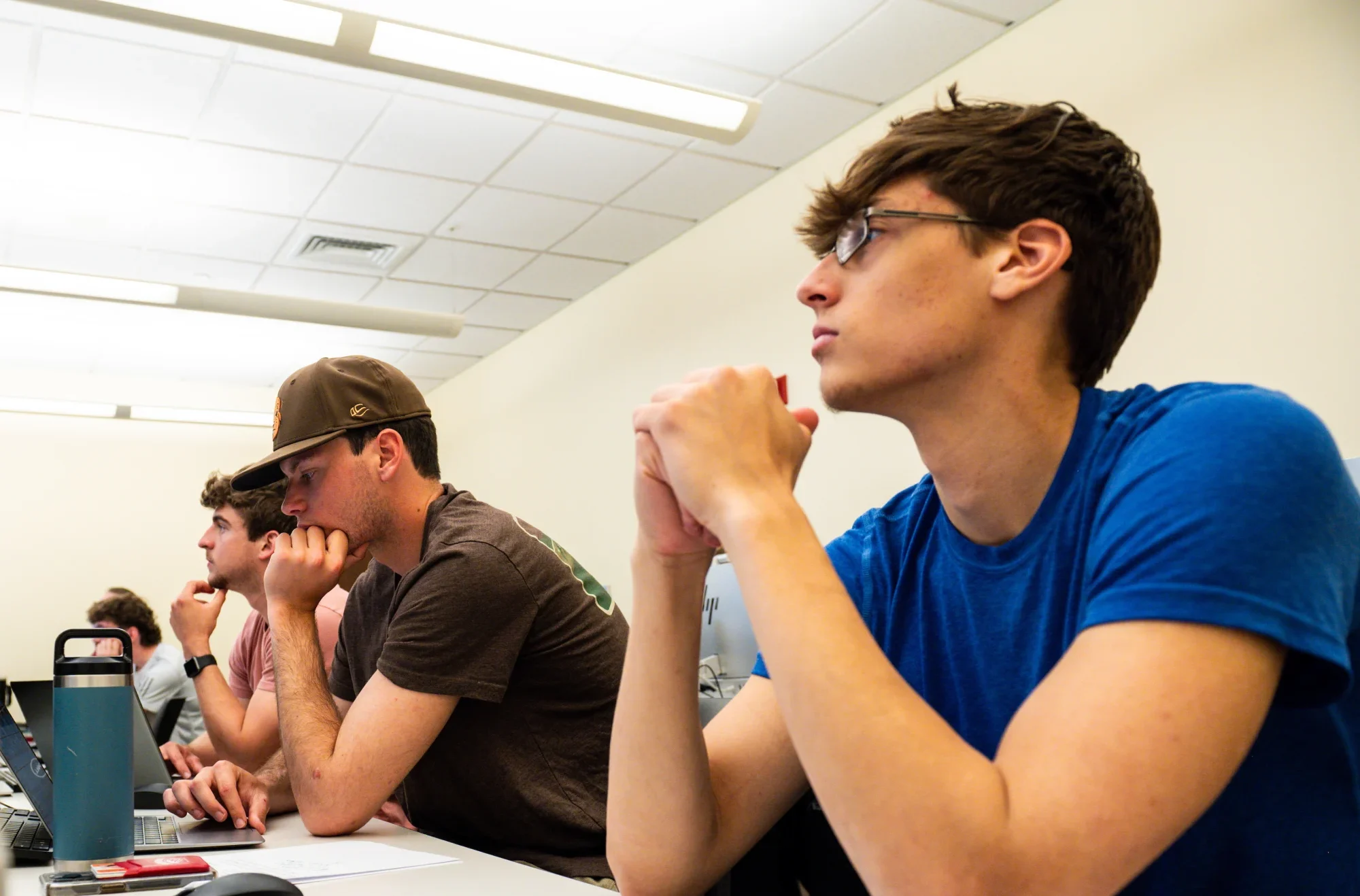
Mathematics Degree
Mathematicians study patterns, from the distribution of prime numbers to the distribution of galaxies, from the shapes of soap films to the structure of musical compositions. While an ancient discipline, mathematics continues to develop at a rapid pace. It is central to all STEM fields and is increasingly important in the social sciences, business and even the arts.
Whether you become a mathematician or statistician, you’ll gain a strong foundation at Susquehanna to succeed in your career. You’ll have the benefit of collaborating on research with faculty experts, who will know you from small class sizes. In the summer, you can earn academic credit for internships or conduct research on campus or at a National Science Foundation site. As a senior, you’ll spend a semester or a year researching in depth a topic of interest to you or pursuing your own original research guided by a faculty mentor.
We make it seamless for you to double or even triple major in mathematics, physics or computer science. Degrees in economics, finance and philosophy also pair well with mathematics. With our 3+2 dual-degree engineering option, you can earn dual degrees: a mathematics bachelor’s degree from Susquehanna and an applied mathematics or engineering degree from an ABET-accredited partner university. You can pursue a graduate degree or a law degree, as law schools favor math students with an analytical background.
SUSQUEHANNA MATH PROFESSOR SHARES HER PASSION
Meet Professor Alathea Jensen and learn what she adores about teaching mathematics at Susquehanna University.

SUsquehanna By the Numbers
More Than Metrics
100%
of students work with faculty on a senior project
100%
of classes have 35 or fewer students
30%+
of majors combine mathematics with a second major
99%
of students receive financial aid through academic merit scholarships and need-based grants
Where Passion Meets Purpose
Straight from the Nest

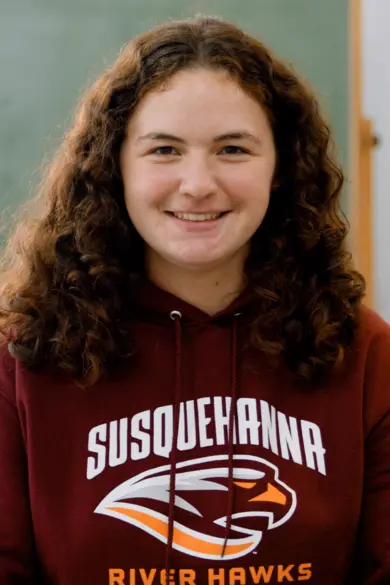
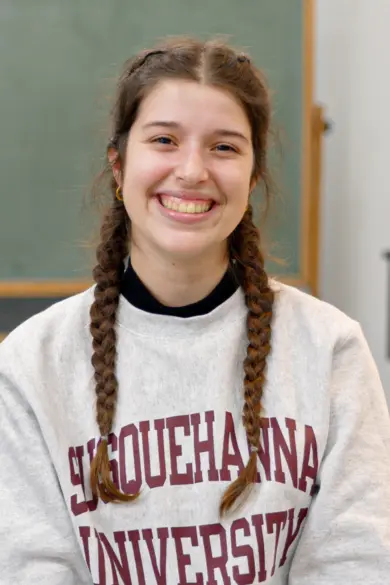
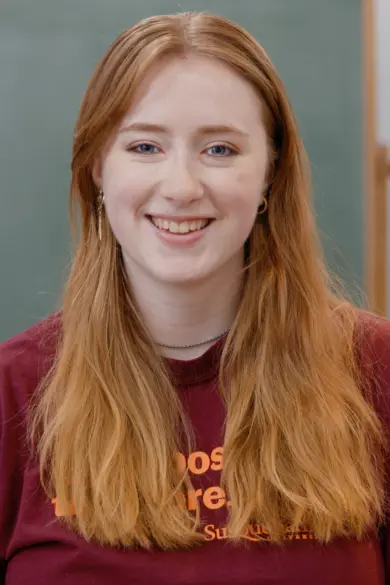
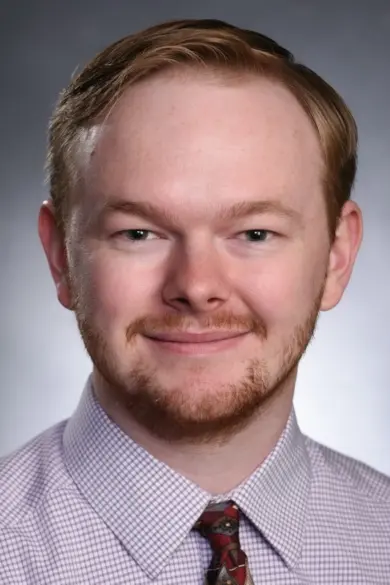
“Susquehanna’s campus has been curated around the student experience, both academically and socially. At Susquehanna University, you get to experience a lot.”
— Sarah Vigilotti ’25
“Susquehanna gives students the opportunity to take education classes as freshmen, and a lot of education programs in other schools don’t allow you take education classes until you are a junior or senior.”
— Nicole Klein ’27
“I love that Susquehanna is a small, interconnected campus that is big on service and helping the community.”
— Alessia Revelli ’26
“I started volleyball club in my freshman year because I played softball for 12 years and I needed to play a sport. Volleyball is something that’s consistent every week that I can try to attend regardless of my schedule. And, it’s really nice to get to know people outside of your classes or your major.”
— Colleen Hueting ’25
“I created a computer simulation of Braess’ Paradox using a program called AnyLogic for my senior capstone project. The traffic system simulation shows how cars travel on a network. I’m grateful to the mathematics department at Susquehanna for giving me the coding knowledge to complete this project and apply my skills to a real-life phenomenon.”
— Nicolaus Gagliano ’23
Explore Your Studies
Program Resources
A Glance Into Your Degree Pathway
With support from advisors and course planning tools, your time at Susquehanna is carefully designed to help you succeed. This example provides a glimpse into your degree experience, but you’ll have plenty of opportunities to customize your path with electives or study abroad programs that reflect your passions and career goals.
An introductory course in computer science for majors. Also open to nonmajors. Emphasizes computer problem-solving methods and algorithmic development. Topics include programming in Python or a comparable language, techniques of good programming style, data types, file and screen input and output, control structures, subroutines, recursion, arrays, and pointers. 4 SH. CC: Analytical Thought.
Systems of linear equations, matrices and matrix algebra, vector spaces, linear transformations, inner product spaces, determinants, eigenvalues and eigenvectors, and selected applications. Prerequisite: MATH-111 Calculus I. 4 SH. CC: Analytical Thought.
An introduction to the basic logical and set-theoretic framework of mathematics and computer science. Topics include logic, proof techniques, mathematical induction, divisibility and modular arithmetic, sets, relations, mappings, graphs, and counting principles. Prerequisite: MATH-111 Calculus I. 4 SH.
An introduction to the basic logical and set-theoretic framework of mathematics and computer science. Topics include logic, proof techniques, mathematical induction, divisibility and modular arithmetic, sets, relations, mappings, graphs, and counting principles. Prerequisite: MATH-111 Calculus I. 4 SH.
Calculus of several variables, partial derivatives, critical points, multiple integrals, gradient, curl, divergence, Green’s, Stokes’ and Divergence Theorems. Prerequisites: MATH-112 Calculus II and MATH-201 Linear Algebra. 4 SH.
An introduction to algebraic structures including groups, rings and fields. Prerequisites: MATH-201 Linear Algebra and MATH-221 Discrete Structures. 4 SH. CC: Writing Intensive.
A rigorous study of the theoretical basis of (single-variable) differential and integral calculus: limits, continuity, differentiation and integration. Prerequisite: MATH-112 Calculus II and MATH-221 Discrete Structures. 2 SH.
Mathematics
Choose from a variety of elective courses within this program to customize your goals.
Mathematics
Choose from a variety of elective courses within this program to customize your goals.
Introduces theory, basic solution methods, qualitative analysis and applications of ordinary differential equations. Prerequisites: sophomore standing, MATH-112 Calculus II, and MATH-201 Linear Algebra or instructor’s permission. 4 SH.
Mathematics
Choose from a variety of elective courses within this program to customize your goals.
Experience in individual research and presentation of topics in mathematics. The one-semester-hour version culminates in a presentation to an audience of faculty and students. Prerequisite: senior major or department permission. 1 or 4 SH. 4 SH version satisfies the capstone requirement.
Computer Science Courses
An introductory course in computer science for non-majors. The course teaches computer programming with emphasis on logical thinking, problem solving, and algorithmic development. PROCESSING or a similar programming language is used. Topics include variables, arithmetic and logical operators, graphics, user interface, built-in library calls, I/O operations, conditional statements, loops, functions, and classes. 4 SH. CC: Analytical Thought.
An introductory course in computer science for majors. Also open to nonmajors. Emphasizes computer problem-solving methods and algorithmic development. Topics include programming in Python or a comparable language, techniques of good programming style, data types, file and screen input and output, control structures, subroutines, recursion, arrays, and pointers. 4 SH. CC: Analytical Thought.
This is the second course in computer programming that builds upon functional programming developed in the prerequisite course. This class introduces object-oriented programming, stressing the importance of planning, design and optimization of object-oriented solutions to programming problems. Topics include objects, classes, constructors, inheritance, polymorphism and design. Prerequisite: CSCI-181 Principles of Computer Science. 4 SH.
This course will explore some of what computer science has to offer to the natural and social sciences. Many phenomena consist of interacting individuals that can be modeled as following a set of behavioral rules. Using a suitable computer language such as NetLogo, Repast or others, we will learn to model these phenomena. Some programming experience is helpful but not required. Prerequisites: Fulfillment of the Analytic Thought requirement, sophomore standing and completion of either the Social Interactions requirement or the Scientific Explanations requirement. Some programming experience would be helpful but is not required. 4 SH. CC: Interdisciplinary.
Second course in computer programming. Stresses the interplay between algorithms, data structures and their implementations. Topics include stacks, queues, linked lists, sorting, searching, binary trees and graphs. Prerequisite: CSCI-181 Principles of Computer Science.
Fundamentals of computer organization and machine architecture. Presents an overview of computer system organization and examines in detail the digital logic level, the register level and the operating system program interface. Uses the assembly language of an available machine for programming assignments. Prerequisite: CSCI-281 Data Structures or instructor’s permission. 4 SH.
This course provides an introduction to the concepts in the automatic extraction of implicit, previously unknown and potentially useful information from large data sets generated in commerce, science and other fields. Topics include preprocessing of the data, application of the fundamental algorithms on the prepared data and interpretation of the patterns discovered by the algorithms. Introduced are the fundamental algorithms for supervised learning, including classification and numerical prediction and unsupervised learning, which includes association rules and clustering. Prerequisites: CSCI-181 and either MATH-180 or both MATH-108 and INFS-233. 4 SH.
An introduction to the computational techniques for solving mathematical problems, focusing on one-variable calculus. Topics include roots of nonlinear equations, finding maximum and minimum, interpolation, function approximation, numerical differentiation and integration. Same as CSCI-351. Prerequisite: MATH-111 Calculus I; MATH-112 Calculus II is suggested. 2 SH.
A study of the standard numerical techniques for solving mathematical problems, focusing on multivariable calculus and linear algebra. Topics include large sparse matrices, eigensystems, solving systems of equations, multivariable interpolation, maximum and minimum of multivariable functions, multivariable numerical integration, and numerical solutions of ordinary and partial differential equations. Same as CSCI-352. Prerequisites: MATH-112 Calculus II, MATH-201 Linear Algebra and MATH-351 Numerical Computing. 2 SH.
Cryptology is the study of hiding the meaning of messages. Cryptology is an interesting venue for the study of its mathematical underpinnings (number theory, matrix algebra, probability and statistics) and as an opportunity to implement techniques by means of computer programs. We will consider monoalphabetic and polyalphabetic encryptions, public key cryptography, security, and anonymity. Same as MATH-370. Prerequisite: MATH-221 Discrete Structures. 4 SH.
Introduces the design and implementation of algorithms using an object-oriented programming language such as C++ or Java. Covers correctness and efficiency of algorithms for sorting, searching, graph problems and mathematical algorithms. Prerequisites: MATH-221 Discrete Structures and CSCI-281 Data Structures. 4 SH.
An introduction to the classical and contemporary theory of computation. Topics include the theory of automata and formal languages, computability by Turing machines and recursive functions, computational complexity and quantum computers. Same as MATH-382. Prerequisites: MATH-221 Discrete Structures and CSCI-281 Data Structures. 2 SH.
An overview of data communications and networks, including channel capacity, Ethernet, Internet protocols, DHCP, DNS, TCP, FTP, SMTP, HTTP, web servers and file sharing. Prerequisite: CSCI-181 Principles of Computer Science. 2 SH.
Further topics in networks, with an emphasis on security. Includes authentication, encryption, verification, certificates, digital signatures, attacks and defenses, privacy, and anonymity. Also covers current developments in networks. Prerequisite: CSCI-391 Data Communications and Networks I. 2 SH.
This course provides an introduction to the systematic study of algorithms and systems that improve their knowledge or performance with experience. A statistical approach that emphasizes concepts and the implementation of the methods is presented to make sense of large and complex data. Topics include linear regression, classification, resampling methods, shrinkage approaches, tree-based methods, support vector machines and clustering. Prerequisites: MATH-180 Statistical Methods (or both MATH-108 Intro to Statistics and INFS-233 Data Driven Decision Making), MATH-201 Linear Algebra, and CSCI-181 Principles of Computer Science. 4 SH.
Programming in a common application environment, such as Android apps. Creation and management of windows, dialog boxes, mouse and keyboard input, message queues, graphics and multithreading. Prerequisite: CSCI-381 Algorithms. 4 SH
The entire software development cycle is explored, from requirements gathering through analysis, design, implementation, testing and documentation procedures. This course discusses both the theory and the business-world reality of software development, with an emphasis on object-oriented methodologies. Prerequisite: CSCI-381 Algorithms or instructor’s permission. 4 SH. CC: Writing Intensive.
This course is designed to provide an experience similar to that of working in the software engineering industry. The methodologies discussed in CSCI-471 Software Engineering: Methodology are put into practice, as students work on project teams throughout one or more software development cycles. Current projects involve designing and developing software to guide a mobile robot. Prerequisites: junior standing and CSCI-471 Software Engineering: Methodology. 4 SH. Capstone. CC: Team Intensive.
Studies the principles underlying various computer languages. Uses comparisons and evaluations of multiple programming languages such as C, Python, Java, FORTRAN, HTML, Postscript, LISP and Prolog to introduce the broad principles of language design and implementation. Prerequisite: CSCI-281 Data Structures. 2 SH.
Studies the phases of compiler design, such as syntax specification, lexical analysis, parsing, symbol tables, error detection, code optimization and code generation. Term project is to write a complete compiler for a small subset of C. Prerequisites: CSCI-282 Computer Organization and MATH-221 Discrete Structures. 4 SH. Capstone.
Basic interactive graphics programming in 2D and 3D using a common graphics library such as OpenGL. Introduces fundamental hardware and software concepts to implement graphics. Covers topics of drawing points, curves, surfaces, lighting, shading, animation, geometrical transformation, representation of 3-D shapes and removal of hidden edges and surfaces as time permits. Prerequisite: CSCI-281 Data Structures and MATH-201 Linear Algebra or instructor’s permission. 2 SH.
A brief summary of the tools, techniques and applications of artificial intelligence. Introduces problem solving and knowledge representation and selects topics from techniques for constructing models, robot design, language processing, computer vision, neural networks and expert systems. Same as INFS-485. Prerequisites: CSCI-281 Data Structures, MATH-111 Calculus I, and either MATH-108 Introduction to Statistics or MATH-180 Statistical Methods. 2 SH.
Introduction to the principles of operating systems through detailed discussion of a popular operating system such as Linux, with special attention to the areas of user interface, process management and file systems. Prerequisite: CSCI-281 Data Structures. 2 SH.
A study of general operating systems principles, processes, file systems, memory management, interprocess communication, I/O and concurrent processes. Includes a programming project in which the student writes a part of an operating system. Prerequisite: CSCI-486 Introduction to Operating Systems. 2 SH.
A study of computer architecture, including logic circuits, CPU design, instruction sets, CISC, RISC, memory architecture, I/O, peripherals, pipelining, superscalar processors and multiprocessors. Includes hardware and software considerations. Prerequisite: CSCI-282 Computer Organization. 2 SH.
Experience in individual research and presentation of computer related topics. Prerequisites: senior standing and computer science department head’s permission. 4 SH. CC: Writing Intensive.
Subjects vary, depending on instructor and student interest. Example topics include software engineering, cryptography, parallel processing, digital video compression, object-oriented technologies, neural networks and others as approved. Prerequisite: Instructor’s permission. 2 or 4 SH.
Individual work for capable students under the supervision of a faculty member. Prerequisite: Instructor consent and approval of computer science department head. Regularly scheduled courses are approved for independent study only under extraordinary circumstances. 2 or 4 SH.
A research project culminating in a substantive paper on a selected topic or field in computer science or information systems by arrangement with an instructor. Prerequisite: junior or senior standing and pdepartment head’s permission. 2 or 4 SH.
Full-time employment in computer science or information systems at an industrial firm or a public service organization. Prerequisites: senior standing, appropriate background courses in computer science and department internship coordinator’s permission. Satisfactory/Unsatisfactory grade. 2, 4, or 8 SH.
Mathematics Courses
Topics include algebra, functions, graphing, exponents, logarithms, exponential functions, trigonometry and solving word problems. Prerequisite: Based on placement results, some students may require a mathematics review course. 4 SH.
This is a two-semester-hour course meant to help education majors satisfy the Pennsylvania state requirement for six credits of college mathematics. Each course will cover a topic of the instructor’s choice at an introductory level. Topics so far have included Symmetry, Counting, and Math and Music. This course does not count toward a math major or minor, and particular topics may overlap enough with other math courses to bar a student from taking both. Education majors will be given priority. Prerequisite: Usually none. 2 SH.
A basic introduction to data analysis, descriptive statistics, probability, Bayes’ Theorem, distributions of random variables and topics in statistical inference. (Students may earn credit for only one of the introductory statistics courses offered by the departments of management, psychology or mathematics.) 4 SH. CC: Analytical Thought.
Differentiation and integration of polynomials, exponential, logarithmic and trigonometric functions, rules of differentiation, the Mean Value Theorem, L’Hôpital’s Rule, the Fundamental Theorem of Calculus and applications. 4 SH. CC: Analytical Thought.
Techniques of integration. Also includes improper integrals, further applications of integration and power series. Prerequisite: MATH-111 Calculus I or equivalent. 4 SH. CC: Analytical Thought.
This course provides a broad overview of introductory statistical methods and data analysis. Topics include descriptive statistics, probability, probability distributions, statistical inferences on population means and population variances, multiple comparisons, categorical data, data analysis using linear regression and multiple regression, design of experiments, and analysis of variance. 4 SH. CC: Analytical Thought.
Systems of linear equations, matrices and matrix algebra, vector spaces, linear transformations, inner product spaces, determinants, eigenvalues and eigenvectors, and selected applications. Prerequisite: MATH-111 Calculus I. 4 SH. CC: Analytical Thought.
Calculus of several variables, partial derivatives, critical points, multiple integrals, gradient, curl, divergence, Green’s, Stokes’ and Divergence Theorems. Prerequisites: MATH-112 Calculus II and MATH-201 Linear Algebra. 4 SH.
An introduction to the basic logical and set-theoretic framework of mathematics and computer science. Topics include logic, proof techniques, mathematical induction, divisibility and modular arithmetic, sets, relations, mappings, graphs, and counting principles. Prerequisite: MATH-111 Calculus I. 4 SH.
A rigorous study of the theoretical basis of (single-variable) differential and integral calculus: limits, continuity, differentiation and integration. Prerequisite: MATH-112 Calculus II and MATH-221 Discrete Structures. 2 SH.
An introduction to algebraic structures including groups, rings and fields. Prerequisites: MATH-201 Linear Algebra and MATH-221 Discrete Structures. 4 SH. CC: Writing Intensive.
A concentrated study of elementary geometry. Includes Euclidean and non-Euclidean geometries and selected topics such as symmetry, Penrose tilings, fractals, knots, mapmaking and the shape of the universe. Prerequisites: MATH-201 Linear Algebra and MATH-221 Discrete Structures. 4 SH.
An introduction to the computational techniques for solving mathematical problems, focusing on one-variable calculus. Topics include roots of nonlinear equations, finding maximum and minimum, interpolation, function approximation, numerical differentiation and integration. Same as CSCI-351. Prerequisite: MATH-111 Calculus I; MATH-112 Calculus II is suggested. 2 SH.
MATH-352 Numerical Analysis. A study of the standard numerical techniques for solving mathematical problems, focusing on multivariable calculus and linear algebra. Topics include large sparse matrices, eigensystems, solving systems of equations, multivariate interpolation, maximum and minimum of multivariable functions, multivariable numerical integration, and numerical solutions of ordinary and partial differential equations. Same as CSCI-352. Prerequisites: MATH-112 Calculus II, MATH-201 Linear Algebra and MATH-351 Numerical Computing. 2 SH.
Introduces theory, basic solution methods, qualitative analysis and applications of ordinary differential equations. Prerequisites: sophomore standing, MATH-112 Calculus II, and MATH-201 Linear Algebra or instructor’s permission. 4 SH.
Cryptology is the study of hiding the meaning of messages. Cryptology is an interesting venue for the study of its mathematical underpinnings (number theory, matrix algebra, probability and statistics) and as an opportunity to implement techniques by means of computer programs. We will consider monoalphabetic and polyalphabetic encryptions, public key cryptography, security, and anonymity. Same as CSCI-370. Prerequisite: MATH-221 Discrete Structures. 4 SH.
An introduction to the classical and contemporary theory of computation. Topics include the theory of automata and formal languages, computability by Turing machines and recursive functions, computational complexity and quantum computers. Same as CSCI-382. Prerequisites: MATH-221 Discrete Structures and CSCI-281 Data Structures. 2 SH.
Limits and continuity in the general context of metric spaces. Topics include basic point-set topology, completeness, uniform continuity, sequences and series of functions. Additional topics as time permits. Prerequisites: MATH-112 Calculus II and MATH-231 Foundations of Analysis. 4 SH. CC: Writing Intensive.
Calculus using complex numbers. Includes analytic functions and the Cauchy-Riemann equations, contour integrals, Cauchy’s Theorem, Cauchy’s Integral Formula, power and Laurent series, poles, residues, and applications. Prerequisites: MATH-211 Multivariate Calculus, and MATH-231 Foundations of Analysis. 4 SH.
A more detailed study of statistics. Topics include probability, multivariate distributions, Bayes’ Theorem, statistical inference, estimation,decision theory, hypothesis testing, linear models and experimental design. Prerequisites: MATH-211 Multivariate Calculus and either MATH-108 Introduction to Statistics or MATH-180 Statistical Methods. 4 SH.
Experience in individual research and presentation of topics in mathematics. The one-semester-hour version culminates in a presentation to an audience of faculty and students. Prerequisite: senior major or department permission. 1 or 4 SH. 4 SH version satisfies the capstone requirement.
Subject depends on students’ and instructor’s interests. Possibilities include: number theory, set theoretic foundations of mathematics, topology, graph theory, differential geometry and applied mathematics. Whether the course counts as a 400-level course for majors will be announced along with the course description. Prerequisite: Instructor’s permission. 2 or 4 SH.
Individual work for capable students under faculty supervision. Scheduled courses are approved for independent study only under extraordinary circumstances. Whether the course counts as a 400-level course for majors will be decided on an individual basis. Prerequisite: Department approval and instructor’s consent. 2 or 4 SH.
A research project leading to a substantive paper on a selected topic in mathematics. By arrangement with a department instructor. Prerequisite: Junior or senior standing and department permission. 2 or 4 SH.
Full-time mathematics-related employment at an industrial firm or a public service organization. Prerequisite: senior standing, appropriate mathematics background courses and departmental internship coordinator’s permission. Satisfactory/Unsatisfactory grade. 2, 4, or 8 SH.
When you enroll at Susquehanna, you’ll be paired with an advisor and application tool to guide you in your course planning and scheduling. The following is an excerpt from the complete course catalog. Enrolled students follow the requirements of the course catalog for the academic year in which they declare each major and/or minor, consult with their advisor(s).
Learning Goals
- The student shows competency in standard mathematical content including calculus and linear algebra.
- The student communicates mathematical ideas, both orally and in writing, with clarity and precision.
- The student applies mathematical skills and knowledge to solve problems and analyze new situations in mathematics and related areas.
Requirements for the Bachelor of Arts in Mathematics
Students complete the equivalent of 47 or 50 semester hours as described.
- 4 MATH-112 Calculus II
- 4 MATH-180 Statistical Methods
- 4 MATH-201 Linear Algebra
- 4 MATH-211 Multivariate Calculus
- 4 MATH-221 Discrete Structures
- 2 MATH-231 Foundations of Analysis
- 4 MATH-321 Abstract Algebra
- 4 MATH-353 Differential Equations
- 4 One 300-level or above mathematics course or PHYS-405 Mathematical Physics
- 8 Two 400-level mathematics courses
- 1 or 4 MATH-500 Senior Colloquium
- 4 CSCI-181 Principles of Computer Science
Teacher Certification
Secondary Teaching Certification Coursework required by the state of Pennsylvania for admission to the teacher certification program includes successful completion of FYSE-100 or equivalent course (having learning goals related to English composition), at least 3 semester hours in British or American literature, at least 6 semester hours of mathematics coursework (or other courses which satisfy the Central Curriculum Analytical Thought requirement) and at least one 40-hour externship.
Education course requirements for secondary education are:
- EDUC-101 Introduction to Education and Society
- EDUC-250 Educational Psychology
- EDUC-260 Introduction to Special Education
- EDUC-270 Instruction of Exceptional Students
- EDUC-330 Technology in Education
- EDUC-350 English Language Learners: Theory and Instruction
- EDUC-380 Instructional Design
- EDUC- 423 Methods of Curriculum, Instruction, and Assessment in Teaching Mathematics
- EDUC-479 Principles of Learning and Teaching in Secondary Education
- EDUC-483 Differentiated Instruction and Classroom Management in Secondary Education
- EDUC-500 Student Teaching package (EDUC-501, EDUC-502, EDUC-503 and EDUC-600)
In addition, secondary education mathematics students complete all of the usual requirements for the mathematics major. They must satisfy the “one 300-level or above mathematics course” requirement by taking MATH-331 Geometry.
Interdisciplinary Options
Mathematics majors can easily complete a minor in another department. Areas such as accounting, business, computer science, biology, chemistry, physics or a modern language are natural choices. The department also sponsors a business-related minor in actuarial science.
Self-designed major
Highly motivated students whose interests cross traditional departmental lines may also consider a self-designed major. This option provides an integrated program of study from courses in several departments and is described in the majors and minors section.
Capstone
The capstone requirement may be satisfied by the four-semester-hour version of MATH-500 Senior Colloquium. Students need not fulfill the capstone requirement in their major, but they usually do.
Double Major/Minor in Computer Science & Mathematics
Because the computer science major already requires several mathematics courses, many computer science majors add a mathematics major or minor relatively easily. However, it is department policy that cross-listed elective courses (such as MATH-351/CSCI-351 Numerical Computing, MATH-352/CSCI-352 Numerical Analysis or MATH-382/CSCI-382 Theory of Computation) count in only one major or minor at a time.
Departmental Honors
The departmental honors program encourages and recognizes outstanding academic performance. To graduate with departmental honors, a mathematics major or computer science major must do the following:
- Have a minimum GPA of 3.50 in the department and 3.00 overall.
- Request admission to the program at the end of the junior year.
- Consult with a faculty advisor to design an honors-quality project and begin research as a first-semester senior taking MATH-503 Independent Research or CSCI-503 Independent Research.
- Complete the project during the second semester in MATH-500 Senior Colloquium or CSCI-500 Senior Colloquium.
- Successfully pass an oral exam covering a selection of math courses.
Kappa Mu Epsilon
Students who meet national standards for membership are eligible to join this national undergraduate mathematics honorary society.
When you enroll at Susquehanna, you’ll be paired with an advisor and application tool to guide you in your course planning and scheduling. The following is an excerpt from the complete course catalog. Enrolled students follow the requirements of the course catalog for the academic year in which they declare each major and/or minor and consult with their advisor(s).
Minor in Mathematics
The minor completes 24 semester hours of mathematics with grades of C- or better. Requirements include MATH-112 Calculus II, MATH-201 Linear Algebra, MATH-221 Discrete Structures, with at least four semester hours at the 300 level or above and 8 semester hours above the 108-level.
- Data analysis
- Banking
- Research and development
- Actuarial science
- Software engineering
Recent Employers
Beyond Susquehanna
Meet the Faculty
TAKE A VIRTUAL TOUR
Launch Fisher Hall – Academics & Student SupportYOU MAY ALSO BE INTERESTED IN
See the full list of related programs on the School of Natural and Social Sciences page.
Have Questions?
Contact Us
Start your journey.
